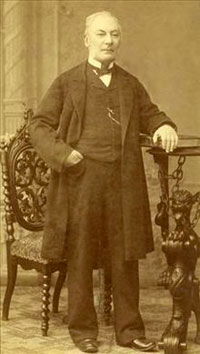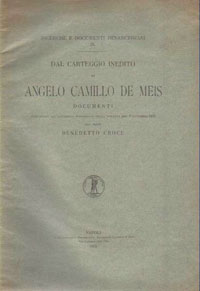


Angelo Camillo De Meis
Bucchianico (Chieti) 1817 - Bologna 1891
Physician and patriot, De Meis first studied at the Royal College of the Piarist Fathers in Chieti, where he met Bertrando and Silvio Spavento; he then moved to Naples, where he attended the clinical school directed by Pietro Ramaglia. After his medical degree, he practised in the Ospedale degli Incurabili (Hospital for Incurables) in the same city, and in 1848 he was named Rector of the Medical Surgical College there.
He cultivated literary and philosophical interests alongside his scientific studies, and Francesco De Sanctis – his contemporary and friend – introduced De Meis into Neapolitan idealist groups. Like Luigi Settembrini and Pasquale Villari, he shared the liberal ideals of the Italian Risorgimento. Accused of conspiracy in the Neapolitan uprisings of 1848, he was in exile in Paris until 1853. After his return to Italy, he was the Representative from Chieti in the first Parliament formed after Italian unification, and was subsequently elected by the constituency of Manoppello in 1865. In his main work, Dopo la laurea, he espoused natural philosophy and a Hegelian aesthetic, and he presented his political and philosophical conceptions in his treatise Il Sovrano.
Main works: Nuovi elementi di fisiologia generale speculativa ed empirica (Napoli 1848-1849); Dopo la laurea. Vita e pensieri (Bologna 1868-1869); I tipi animali. Lezioni (Bologna 1872-1875); Il Sovrano. Saggio di filosofia politica con riferenza all’Italia (1868; a cura di B. Croce, Bari 1927).
Bibliography: A. Del Vecchio Veneziani, La vita e l’opera di Angelo Camillo De Meis, Bologna, Zanichelli 1921; U. Russo, Studi sul De Meis e sulla cultura abruzzese tra Otto e Novecento, Pescara, Ed. Trimestre 1975; F. Tessitore, De Meis, Angelo Camillo, in Dizionario Biografico degli Italiani, vol. 38 (1990); L. Mammarella, Storia di un italiano. Angelo Camillo De Meis, Roma, D. Borgia 1991; R. Colapietra, Angelo Camillo De Meis politico “militante”, Napoli, Guida Editori 1993.